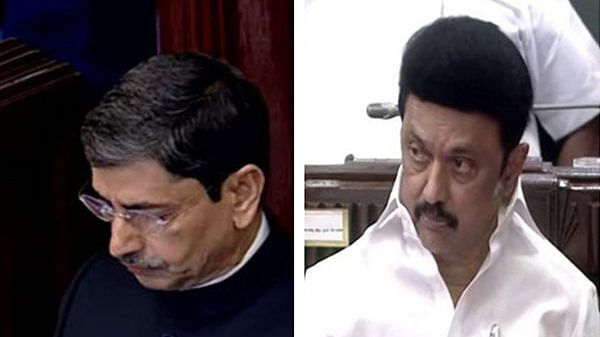The Tamil Nadu Assembly has finally passed a resolution, grudgingly though, thanking the Governor for his address — albeit a controversial one. The resolution, nevertheless, recorded the “agony of the House” for the acts of omissions & commissions by the Governor.
The ruling Dravida Munnetra Kazhagam (DMK) in Tamil Nadu has accused the Governor of not following the tradition of reading out the script handed over to him by the state government. But the Governor’s office has maintained that the Governor is within his constitutional rights to speak what he thinks is appropriate even when his speech is drafted by the government of the day. The immediate trigger appears to be the Governor’s sankranti invite in the name of “Tamilagam”, which is the how the state is referred to by all parties in the state, including the DMK. The Governor also refused to mention the state government’s performance as “the best Dravidian model” one.
What the Constitution says
Two features about the post of the Governor are important to note when considering the relations between his office and the respective elected government representing a particular political party or a group.
One, usually, Governors (and the President of India) are part of the governments and refer to the dispensation as “my government”. This is not just a formality but a tradition that binds the government and the head of state, suggesting that the two are not different even when one is an elected post and the other an appointed office with much greater authority and responsibility.
The other feature is that the person appointed as Governor is expected to be apolitical and non-partisan.
The Constituent Assembly (CA) has discussed the issue of the post of Governor for then ‘Provinces’ (now referred to as states) at length. The debate centered around having an elected Governor who will have the political authority “so as to be able to interfere with the government” if party factions pose a threat to the province or democracy. Those who favoured appointing a Governor by the President, based on the recommendation of the Government of India, emphasised on the need to empower the post with the authority of the Union government. Members also suggested that the person should be “detached from the province” — meaning they should come from outside of the state he/she is posted in, so as to discharge their duties with a free mind, perfectly detached and unassociated with different factions or sections of opinion in the province. Incidentally, one of the members of the Constituent Assembly Shrimati G. Durga Bai, representing then Madras (General) category, strongly advocated for the Governor to be not a member of any legislature or a party (draft article 135). That in the preset case, the Governor’s party (BJP-RSS) affiliation should be a subject of intense debate in Chennai is ironical, to say the least.
The Tamil Nadu Governor R. N. Ravi chose to follow certain procedures and use of words that were of not much consequence in other states but are of part of the historical debate in Tamil Nadu such as “Union of India” and Prime Minister of India”. Office of the Governor Ravi’s has argued that the term “Prime Minister of India” is irrelevant after the adoption of the Constitution as it has replaced the words “Premier of the Province” to “Chief Minister of the State”. The DMK will be well advised to desist from hair splitting on words and nomenclatures that belong to a distant colonial past.
Also read: The plastic age of Indian politics is being ruled by flex. But don’t look for a meaning in it
Nothing new in Tamil Nadu
The spat between the government and the Governor is neither new nor an isolated one. This seems to be one more in the series of differences that has a long history in several states.
The spat between the Rajasthan chief minister Ashok Gehlot and the Governor was in the open when the CM accused the latter of misusing his powers. The Governor on his part hit back at the CM for demanding a trust vote at a very short notice and that too when he claimed majority. Even a veteran politician like Mulayam Singh Yadav had accused the then Governor T. V. Rajeswar of plotting to dismiss his government when he was the CM of Uttar Pradesh in 2006.
The ongoing conflict between the state government and the Governor in Kerala has hit the headlines many times. The issue of serious disagreements between the governor and the CM in Kerala went to the High Court, which granted a special sitting for the government to challenge the Chancellor’s (governor) order seeking the resignation of nine vice-chancellors. The powers of the Governor in the appointment of vice-chancellors to universities was sought to be curtailed and transferred to the CM in Maharashtra under the then MVA government. The Governor sat over the Bill, which finally became infructuous with the government’s collapse.
The issue of differences of opinion between the Governors and the state government is an unfortunate one and might not have a ready answer in the Constitution either. The Constitution is very elaborate and detailed to the last point in this matter. Going by the Constituent Assembly debates, the makers of the Constitution have envisaged every possible situation that might develop in the years to come. Yet, it would be humanly impossible for even the best minds to predict the shenanigans that a politician would play to have their own way in every situation. The post of Governor is one of high levels of authority and great amount of responsibility. It must evoke respect and cooperation but never be taken for granted.
Seshadri Chari is the former editor of ‘Organiser’. He tweets @seshadrichari. Views are personal.
(Edited by Anurag Chaubey)



